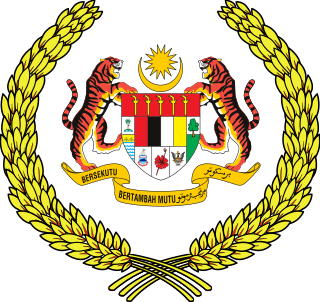
The Yang di-Pertuan Agong, also known as the Supreme Head of the Federation, the Paramount Ruler, or simply the Agong and also unofficially as the King of Malaysia is the constitutional monarch and head of state of Malaysia. The office was established in 1957, when the Federation of Malaya gained independence from the United Kingdom. The Yang di-Pertuan Agong is elected by the Conference of Rulers, comprising the nine rulers of the Malay states, with the office de facto rotated between them, making Malaysia one of the world's few elective monarchies.
In Malaysia, the Yang di-Pertua Negeri is a constitutional title given to the head of state in states without a ruler, namely: Penang, Malacca, Sabah and Sarawak. This is in contrast to a Ruler which is a constitutional title given to states with hereditary monarchies, namely: the Sultans of Johor, Kedah, Kelantan, Pahang, Perak, Selangor and Terengganu; the Raja of Perlis: and the Yang di-Pertuan Besar of Negeri Sembilan.
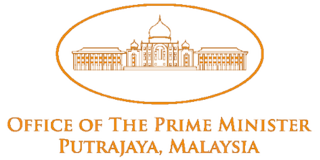
The prime ministerof Malaysia is the head of government of Malaysia. The prime minister directs the executive branch of the federal government. The Yang di-Pertuan Agong appoints the prime minister as a member of Parliament (MP) who, in his opinion, is most likely to command the confidence of a majority of MPs. The Prime Minister is usually the leader of the party winning the most seats in a general election.

The Parliament of Malaysia is the national legislature of Malaysia, based on the Westminster system. The bicameral parliament consists of the Dewan Rakyat and the Dewan Negara. The Yang di-Pertuan Agong (King), as the head of state, is the third component of Parliament.
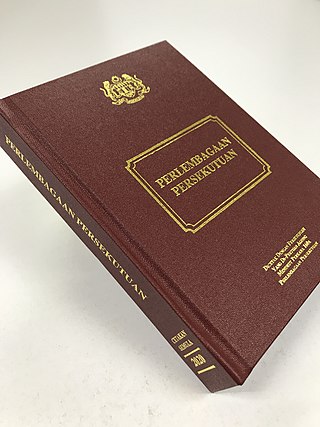
The Federal Constitution of Malaysia, which came into force in 1957 as the Constitution of the Federation of Malaya and was amended in 1963 to form the Constitution of Malaysia, is the supreme law of Malaysia and contains a total of 183 articles. It is a written legal document influenced by two previous documents, the Federation of Malaya Agreement 1948 and the Independence Constitution of 1957. The Federation was initially called the Federation of Malaya and it adopted its present name, Malaysia, when the states of Sabah, Sarawak and Singapore became part of the Federation. The Constitution establishes the Federation as a constitutional monarchy, having the Yang di-Pertuan Agong as the Head of State with largely ceremonial roles. It provides for the establishment and organisation of three main branches of the government: the bicameral legislative branch called the Parliament, which consists of the House of Representatives and the Senate ; the executive branch led by the Prime Minister and his Cabinet Ministers and the judicial branch headed by the Federal Court.

The Queen of Malaysia, also known as the "Paramount Consort", is the consort of the Yang di-Pertuan Agong, the elected, constitutional federal monarch of Malaysia.
This article lists important figures and events in Malaysian public affairs during the year 1969, together with births and deaths of notable Malaysians. Race riots following the general election of 10 May led to the dissolution of parliament and an interim legislative council being put in place.
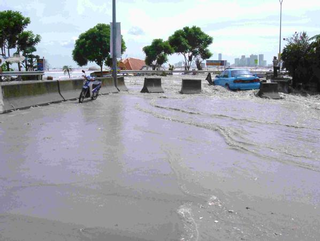
This article lists important figures and events in Malaysian public affairs during the year 2004, together with births and deaths of notable Malaysians.
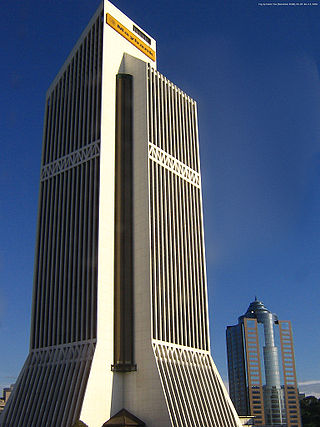
This article lists important figures and events in Malaysian public affairs during the year 1987, together with births and deaths of notable Malaysians.

The Conference of Rulers in Malaysia is a council comprising the nine rulers of the Malay states, and the governors of the other four states. It was officially established by Article 38 of the Constitution of Malaysia, and is the only such institution in the world, according to the Malaysian National Library.
In Australian political and constitutional terminology, a caretaker government is a government of Australia from when the House of Representatives is dissolved by the Governor-General prior to a general election to a period after the election, until the next ministry is appointed. A caretaker government is expected to conduct itself in accordance with a series of well-defined conventions administered by the Department of the Prime Minister and Cabinet, but there is no law compelling the caretaker government to do so.

Al-Sultan Abdullah Ri'ayatuddin Al-Mustafa Billah Shah ibni Almarhum Sultan Haji Ahmad Shah Al-Musta'in Billah is the Sultan of Pahang since the abdication of his father in 2019. He was the sixteenth Yang di-Pertuan Agong (King) of Malaysia, from 2019 to 2024, being sworn in just a few weeks after ascending to the throne as Sultan of Pahang.
The installation of the Yang di-Pertuan Agong is a ceremony that formally marks the beginning of the reign of the Yang di-Pertuan Agong as the Malaysian head of state.
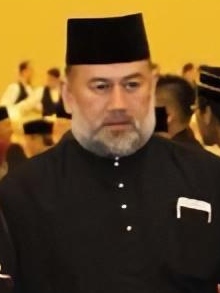
Sultan Muhammad V is the 29th Sultan of Kelantan since ascending to the throne in 2010. He previously reigned as the fifteenth Yang di-Pertuan Agong of Malaysia from 2016 until his abdication in 2019.
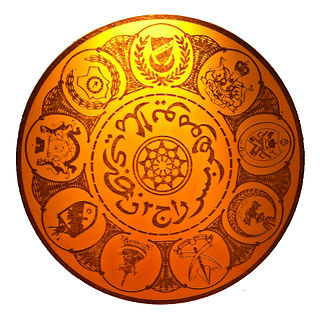
The monarchies of Malaysia exist in each of the nine Malay states under the constitutional monarchy system as practised in Malaysia. The political system of Malaysia is based on the Westminster parliamentary system in combination with features of a federation.
The state governments in Malaysia are the governments ruling the 13 states in the federation of Malaysia. All 13 states adopts the Westminster Parliamentary system and each has a unicameral state legislative assembly. Each of the States of Malaya is run by an EXCO, while Sabah and Sarawak have their respective Cabinet and Ministry. The state government structure in all 13 states is similar to the government system of the federal government of Malaysia and that the state legislatures consist of only a single chamber.

The Premier of Sarawak is the head of government of the Malaysian state of Sarawak. The premier is appointed by the Governor, also known as the state's governor. The premier is also the leader of the political party or coalition able to secure a majority in the Council Negri.
This is a list of events in the year 2019 in Malaysia.

The 2020–2022 Malaysian political crisis was triggered after several Members of Parliament (MPs) of the 14th Malaysian Parliament changed party support, leading to the loss of a parliamentary majority, the collapse of two successive coalition governments, and the resignation of two Prime Ministers. The political crisis culminated in a 2022 snap general election and eventual formation of a coalition government.
In Canadian political and constitutional terminology, a caretaker government is a government of Canada or provincial government from when parliament or the provincial legislature is dissolved by the governor general or provincial lieutenant governor prior to a general election to a period after the election, until the next ministry is appointed. A caretaker government is expected to conduct itself in accordance with a series of well-defined conventions administered by the Privy Council Office or equivalent provincial agency, but there is no law compelling the caretaker government to do so.













